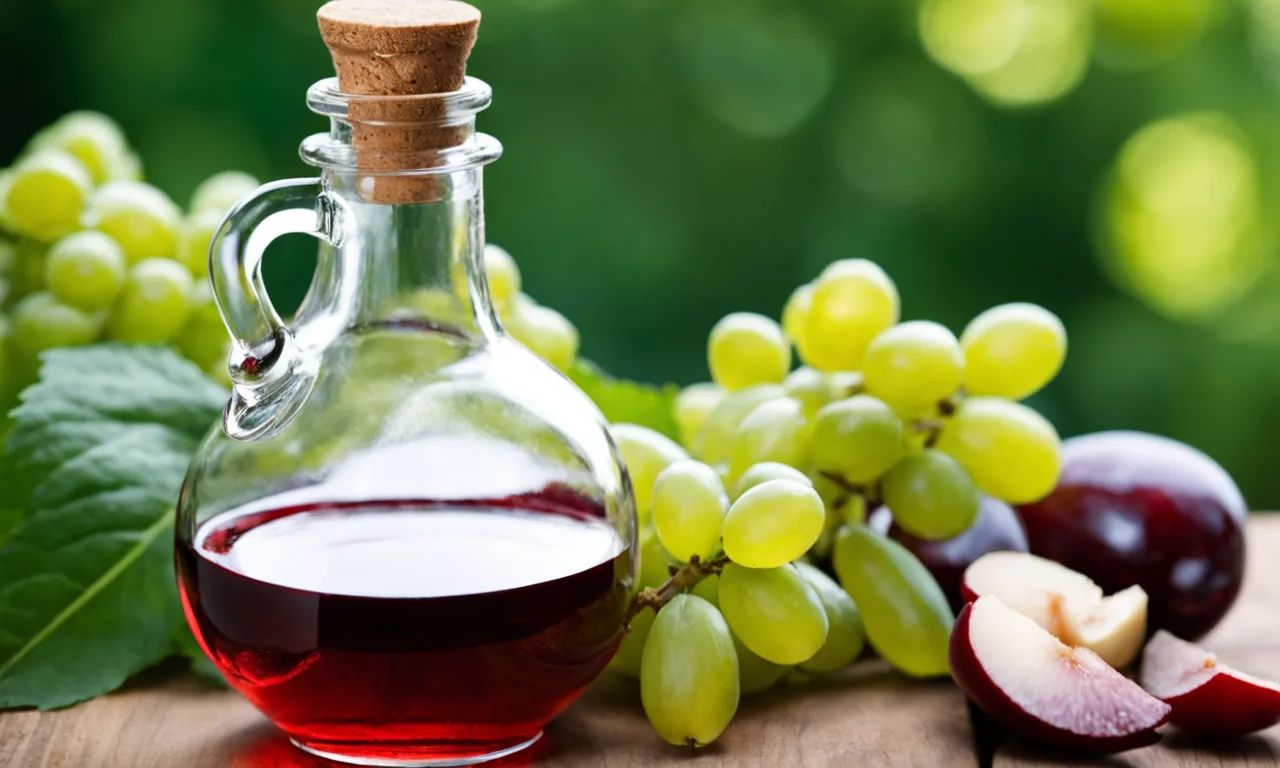Is Red Wine Vinegar Vegan? Examining Production Methods And Ingredients
Red wine vinegar is a popular ingredient used in salad dressings, marinades, and many other foods. But with the word ‘wine’ in the name, some vegans wonder if this vinegar contains traces of animal products or has other non-vegan factors in its production.
This thorough guide will examine how red wine vinegar is made and its suitability for plant-based diets.
If you’re short on time, here’s a quick answer: Yes, red wine vinegar is generally considered vegan. It’s typically made by fermenting and acidifying red wine, a process that does not introduce any animal products.
Overview of Red Wine Vinegar Production
Red wine vinegar is a popular condiment known for its tangy flavor and versatility in various culinary applications. It is widely used in salad dressings, marinades, and sauces. Understanding how red wine vinegar is produced can help answer the question of whether it is vegan-friendly or not.
Made from red wine
Red wine vinegar, as the name suggests, is made from red wine. The process begins by fermenting red wine to convert its alcohol into acetic acid. This fermentation process involves the growth of beneficial bacteria called Acetobacter, which converts the wine’s ethanol into acetic acid through a series of chemical reactions.
Fermentation and acidification
During fermentation, the red wine is exposed to oxygen, allowing the Acetobacter bacteria to thrive and convert the alcohol content. This process typically takes several weeks to months, depending on the desired acidity level.
The longer the fermentation process, the stronger and more acidic the vinegar becomes.
Malolactic fermentation
Some red wine vinegar producers may choose to undergo a secondary fermentation process called malolactic fermentation. This process involves the conversion of malic acid, naturally present in wine, into lactic acid.
Malolactic fermentation can enhance the flavor profile of the vinegar by reducing the sharpness and adding a smoother, more buttery taste.
Aging process
After fermentation, red wine vinegar is often aged to enhance its flavor and complexity. The aging process can vary from a few months to several years, depending on the desired taste. During this time, the vinegar is stored in barrels made from various types of wood, such as oak, which can impart unique flavors to the final product.
It is important to note that the production of red wine vinegar does not involve any animal-derived ingredients. Therefore, it is generally considered vegan-friendly. However, it is always a good idea to check the label or contact the manufacturer to ensure that no animal by-products were used in the production process.
For more information on red wine vinegar production, you can visit reputable sources such as www.winefolly.com or www.winemag.com for a detailed understanding of the process.
Examining the Red Wine Used
When it comes to determining whether red wine vinegar is vegan, it’s important to start by examining the red wine that serves as its base. The quality and production methods of the wine can have a significant impact on its vegan status.
Origins of the wine
The origins of the red wine used in the production of red wine vinegar play a crucial role in determining its vegan status. The grapes used to make the wine might come from various regions, and it’s important to understand the winemaking practices employed in those regions.
Winemakers from different parts of the world may have different approaches to cultivation, with some opting for traditional methods and others adopting more modern techniques. Understanding the vineyard’s practices can give insight into the potential use of animal products in the winemaking process.
Ingredients in winemaking
During the winemaking process, various ingredients are used to ferment the grapes and develop the desired flavors. These ingredients can vary depending on the winery and winemaker’s preferences.
While grapes are the primary ingredient, yeast is often added to initiate fermentation. Other common ingredients include sulfites and clarifying agents such as bentonite or isinglass. These clarifying agents help remove impurities and sediments from the wine.
Use of animal products
Historically, animal products like isinglass, which is derived from fish bladders, have been used as fining agents in winemaking. Fining agents are used to clarify and stabilize the wine, allowing unwanted particles to settle at the bottom of the barrel or tank.
However, with the growing awareness and demand for vegan products, many wineries have started using alternative fining agents. These can include plant-based options like bentonite clay or activated charcoal, making the winemaking process more animal-friendly.
Organic, biodynamic & vegan wineries
For those seeking vegan red wine vinegar, exploring wines produced by organic, biodynamic, or specifically vegan wineries may be a suitable option. These wineries prioritize sustainable and animal-friendly practices throughout the entire winemaking process.
Organic wineries avoid the use of synthetic pesticides and fertilizers, while biodynamic wineries take a holistic approach by considering the vineyard as a complete ecosystem. Vegan wineries go a step further, guaranteeing that no animal products are used at any stage of the winemaking process.
By supporting these types of wineries, consumers can ensure that the red wine vinegar they use aligns with their vegan lifestyle choices.
Other Potential Animal Ingredients
Added honey
While red wine vinegar is typically made from fermented red wine, some brands may add honey during the production process. Honey is derived from bees and is not considered vegan. Therefore, if you follow a strict vegan diet, it is important to check the label or contact the manufacturer to confirm that the red wine vinegar you are purchasing does not contain any added honey.
Milk or egg derivatives
Another potential concern for vegans is the use of milk or egg derivatives in the production of red wine vinegar. However, it is important to note that traditional red wine vinegar production methods do not involve the use of these ingredients.
The process typically includes fermenting red wine with bacteria, which converts the alcohol into acetic acid. Therefore, unless stated otherwise on the label, red wine vinegar is generally free from milk or egg derivatives.
Fining and filtering agents
During the production of red wine vinegar, fining and filtering agents may be used to clarify and remove impurities. Some of these agents may be derived from animals, such as gelatin or isinglass (derived from fish bladder).
However, it is important to note that these agents are typically removed during the vinegar production process, and the final product is filtered to ensure clarity. Therefore, the presence of fining and filtering agents derived from animals in red wine vinegar is minimal, if any.
It is worth mentioning that the use of animal-derived fining and filtering agents in red wine vinegar production is not as common as it is in the production of red wine itself. This is because vinegar is made by further fermenting wine, which reduces the need for additional clarification methods.
Nevertheless, if you have concerns about the use of fining and filtering agents in red wine vinegar, you can opt for brands that explicitly state that their vinegar is vegan-friendly or use alternative vinegar options that are certified vegan.
Varieties and Brands of Red Wine Vinegar
Balsamic vinegars
When it comes to red wine vinegar, one of the most popular varieties is balsamic vinegar. Balsamic vinegar is known for its rich, dark color and sweet, complex flavor. It is made from the juice of Trebbiano grapes, which are cooked down and aged in wooden barrels.
The aging process gives balsamic vinegar its distinct flavor and aroma. Balsamic vinegar can be used in a variety of dishes, from salads to marinades to desserts.
Pure vs imitation
When shopping for red wine vinegar, it’s important to distinguish between pure and imitation varieties. Pure red wine vinegar is made solely from red wine, while imitation red wine vinegar is made from a combination of red wine vinegar and other ingredients, such as water and food coloring.
Pure red wine vinegar is typically considered more authentic and of higher quality. It is important to read the labels carefully to ensure that you are purchasing a pure red wine vinegar.
Recommended vegan brands
For vegans looking to incorporate red wine vinegar into their diet, there are several brands that offer vegan-friendly options. One popular brand is Pompeian, which offers a variety of red wine vinegars that are certified vegan.
Another brand to consider is Bragg, which offers an organic and raw red wine vinegar that is also vegan. These brands can typically be found at most grocery stores or online retailers.
It’s important to note that while red wine vinegar is generally considered vegan, it’s always a good idea to double-check the ingredients and manufacturing processes of the specific brand you are purchasing.
Some brands may use animal-derived fining agents or other non-vegan ingredients in their production methods.
Uses in Vegan Cooking and Baking
Red wine vinegar is a versatile ingredient that can enhance the flavors of various dishes in vegan cooking and baking. Its tangy and acidic taste adds a delightful kick to a wide range of recipes. Here are some popular uses of red wine vinegar in vegan cooking:
Vinaigrettes and Marinades
Red wine vinegar is a key component in making delicious vinaigrettes and marinades for salads and grilled vegetables. It pairs well with olive oil, herbs, and spices, creating a flavorful dressing or marinade that can elevate a simple salad or enhance the taste of grilled tofu or tempeh.
Pickling Vegetables
Red wine vinegar is commonly used for pickling vegetables, such as cucumbers, onions, and peppers. The acidity of the vinegar helps preserve the vegetables while infusing them with a tangy and slightly sweet flavor.
Pickled vegetables can be enjoyed on their own as a snack or used as a condiment in sandwiches and wraps.
Glazes and Reductions
When reduced, red wine vinegar can be used to create glazes and reductions for savory dishes. It can add depth of flavor to sauces, gravies, and stews. The acidity of the vinegar can balance out the richness of the dish, creating a harmonious taste that tantalizes the taste buds.
Baked Goods
Red wine vinegar can also be incorporated into vegan baked goods. It can act as a leavening agent when combined with baking soda, helping the dough rise and creating a light and fluffy texture. Additionally, the vinegar can add a subtle tanginess to cakes, muffins, and breads, enhancing their overall flavor profile.
Conclusion
When produced traditionally from vegan-friendly red wine, red wine vinegar can be safely enjoyed as part of a plant-based diet. Checking labels for added ingredients is still recommended when selecting a quality vegan vinegar.







